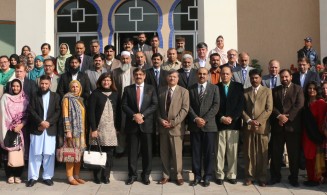Mauritania’s “National Programme for Development of the Education Sector” (PNDSE 2011-2020) gives particular attention to basic education. This addresses Mauritania’s challenges, with among the lowest rates in primary school enrolment and adult literacy in the Middle East and North Africa region, as well as significant gender disparities in education, to the disadvantage of girls’ access. Evidence shows that illiteracy and low educational achievement are being passed from one generation to the next. Existing evidence from around the world seems to indicate that community-based family learning strategies can play a vital role in addressing the literacy challenge. Usually, the family literacy approach combines elements of adult education, parents’ education and pre-school or/ and primary education – to enhance the literacy of both adults and children and to support teachers and parents in preventing future drop-out. Community-based provision strengthens the capacity of the local community to support families.
Download: Review of international experience and best practice in family literacy
(PDF 781 KB)
- Author/Editor: UIL
-
Review of international experience and best practice in family literacy
- UNESCO Institute for Lifelong Learning - 2011
- Available in: English, Arabic




